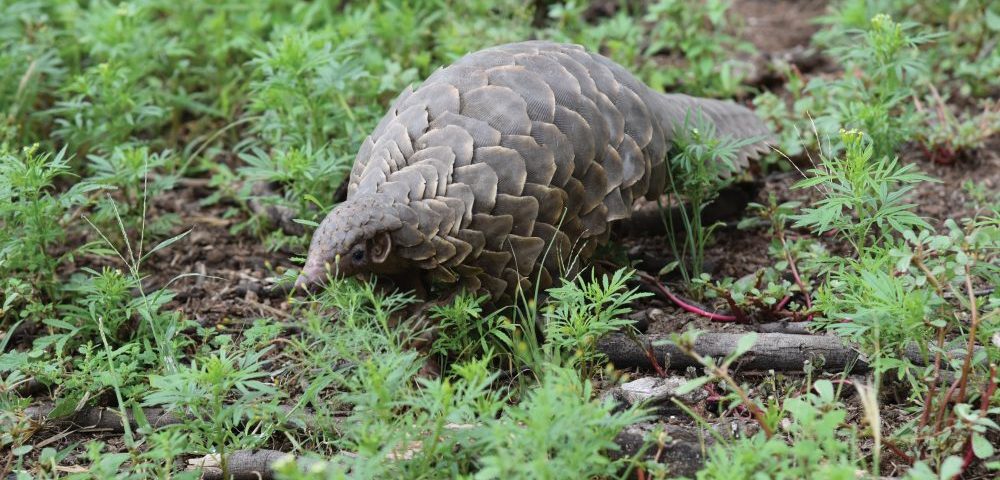
TNN’s Most Romantic Destinations in Namibia
February 14, 2019
Eco-Adventures in Swakopmund
February 19, 2019Photographs Jo Tagg
Pangolins certainly are not the most glamorous animals, yet they are the most trafficked. In Namibia, the fight against trafficking has become the defence of these defenceless animals. Nina van Schalkwyk finds out more.
Prince William said pangolins might be extinct before most people even know they existed. National Geographic and others referred to them as the most trafficked animal that you have never heard of. Most people are surprised to learn that the humble pangolin is the most trafficked species in the world, more than elephants, rhinos and tigers combined.
Pangolins were almost unheard of creatures until concerted efforts were made by the international conservation community to bring attention to the shocking threat of their impending extinction. In 2017 the Convention on the International Trade in Endangered Species of Wild Fauna and Flora (CITES), held in Johannesburg, placed all eight species of pangolin on Appendix I. This means that the four species of pangolin in Africa and their four Asian counterparts are deemed to be extremely vulnerable to extinction and trade in these animals is highly illegal.

Most people would be surprised to learn that the humble pangolin is the most trafficked species in the world, more than elephants, rhinos and tigers combined.
The only species of pangolin found in Namibia, Temminck’s ground pangolin (Smutsia
Temminckii), is relatively abundant and considered of least concern globally. However, the depletion of Asia’s pangolin species has redirected poachers’ attention to Africa. According to the Namibia Chamber of Environment (NCE), it became clear in 2017 that the illegal trade in pangolins was increasing but that the characteristics were changing. Whereas previously pangolins had been caught for use in the local market they were now being transported to Asian markets. The NCE, together with the Ministry of Environment and Tourism, as well as partner organisations responded by setting up a reward scheme and a hotline in September 2017, which resulted in 15 criminal cases and the arrest of 21 suspects during the first two months. A year later 34 live pangolins had been saved and many released back into the wild.
But why pangolins? The strange little creatures, a combination of hedgehog, the size of a beach ball, plated in armoured scales and equipped with a long, sticky tongue – as described by Peter Lafontaine of the International Fund for Animal Welfare (IFAW) – are in high demand on the black market. Their scales consist of keratin, the same substance that human hair and nails are made of, but they are prized in Vietnam and China for use in traditional medicine. Moreover, their meat is considered a delicacy and eating pangolin a sign of prestige.

Pangolins are extremely important to an ecosystem. Feeding on millions of ants and termites annually, their demise could mean termite damage of N$600 million on a national level. That’s in just one year. Their long sticky tongues are adept at probing into holes to pluck out ants and termites. It is the perfect tool for squeezing into tight tunnels in search of food. The pangolin tongue goes all the way down through its abdomen and is attached to its last rib. In contrast, the human tongue is attached to the hyoid bone, a small structure floating between the chin and throat. Pangolins do not have teeth but swallow small pieces of rocks or stones along with their food, which helps with digestion. Their stomachs have keratinous spines which further grind up their food.
These nocturnal loners are known for rolling up into a tight little ball when threatened, their scales keeping them safe from bites or scratches. But this survival tactic has made them more vulnerable to humans, as poachers easily pick up the rolled-up animal and walk off with it. No guns, no shots, not even any danger of being bitten. Considering their slow birth-rate, their harmless nature and the near-impossibility of being kept in captivity, it is a wonder the species has lasted as long as it has.

About the Reward Scheme
The Ministry of Environment and Tourism and other partner organisations set up a reward scheme for information leading to the arrest of people catching, killing, trading and trafficking pangolins.
Members of the public are requested to report any suspicious activity and may receive a cash reward for information that leads to the arrest of culprits or the confiscation of pangolins or pangolin products. Such information can include people asking about pangolins or offering pangolins or pangolin parts for sale. The hotline is available for information by phone call or SMS at 081 413 2214 or 081 423 2231 around the clock.
In addition, penalties for possession and trade in pangolins were increased significantly. Anyone in possession of pangolins or pangolin products can be charged with a fine of up to N$15 million or up to 15 years in prison or both.
This article was first published in the Summer 2018/19 issue of Travel News Namibia.



1 Comment
Let us protect and maintain the natural beauty of our beloved country Namibia, because it attracts tourists .